
JOURNAL OF HELMINTHOLOGY
Scope & Guideline
Fostering excellence in parasitological studies.
Introduction
Aims and Scopes
- Taxonomy and Systematics of Helminths:
The journal frequently publishes articles focused on the description of new helminth species and the revision of existing taxa, utilizing morphological and molecular techniques to clarify phylogenetic relationships among helminths. - Host-Parasite Interactions:
Research on the dynamics of interactions between helminths and their hosts is a core focus, examining how these relationships affect host health, immune response, and ecological balance. - Epidemiology and Public Health:
The journal addresses the epidemiological aspects of helminth infections, including prevalence studies, risk factors, and impacts on public health, particularly in relation to zoonotic diseases. - Control and Management Strategies:
Papers exploring the efficacy of various therapeutic approaches, including traditional and novel antihelminthic treatments, as well as integrated pest management strategies in agricultural settings, are central to the journal's mission. - Environmental and Ecological Studies:
The *Journal of Helminthology* emphasizes research on the ecological roles of helminths, their responses to environmental changes, and their impact on biodiversity and ecosystem health.
Trending and Emerging
- Molecular and Genomic Approaches:
Recent articles increasingly utilize molecular techniques, such as next-generation sequencing and genomic analysis, to unravel the complexities of helminth biology, including species identification and evolutionary relationships. - Impact of Climate Change on Helminth Populations:
Emerging research is focusing on how climate change affects helminth distribution, life cycles, and host interactions, emphasizing the need for adaptive management in both wildlife and agricultural contexts. - Integrated Control Strategies:
There is a growing trend towards exploring integrated control strategies that combine biological, chemical, and environmental management practices to address helminth infections in both humans and animals. - Helminth Microbiomes and Ecosystem Interactions:
Research into the interactions between helminths, their microbiomes, and the broader ecosystem is gaining traction, highlighting the importance of understanding these relationships for ecological health. - Zoonotic Helminth Infections:
With increasing global mobility and environmental changes, studies addressing zoonotic helminths and their transmission dynamics to humans are becoming more prevalent, reflecting public health priorities.
Declining or Waning
- Traditional Morphological Studies:
While still important, there is a noticeable decline in purely morphological studies of helminths as researchers increasingly adopt molecular techniques that provide deeper insights into phylogeny and taxonomy. - Studies on Helminth Parasites in Domestic Animals:
Research focused on helminths of domestic animals is becoming less prominent, possibly due to a shift towards wildlife and zoonotic studies, reflecting growing concerns about biodiversity and ecosystem health. - Single-Species Infection Studies:
There is a decreasing trend in studies investigating single-species infections, as the complexity of co-infections and multi-species interactions gains more attention in contemporary research.
Similar Journals
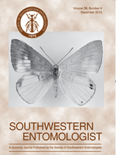
SOUTHWESTERN ENTOMOLOGIST
Unveiling Insights for Sustainable Agricultural PracticesSOUTHWESTERN ENTOMOLOGIST is a pivotal academic journal dedicated to advancing the fields of Agronomy, Ecology, and Insect Science. Published by the SOUTHWESTERN ENTOMOLOGICAL SOC in the United States, this journal plays a crucial role in disseminating vital research findings that address pressing ecological and agricultural challenges. With its ISSN 0147-1724 and E-ISSN 2162-2647, the journal has been publishing comprehensive studies since 1993 and continues to contribute significantly to the knowledge base up to 2024. As a Q4 ranked journal in both Agronomy and Crop Science and Ecology, as well as Insect Science, it provides an inclusive platform for researchers and students to share their insights and foster collaborations. Although it currently does not offer open access options, the content is accessible to academic institutions and professionals, ensuring that significant findings reach a broad audience. Given its niche focus, SOUTHWESTERN ENTOMOLOGIST not only appeals to researchers and students but also to professionals looking to stay updated on the latest trends and developments in entomology and its related fields.
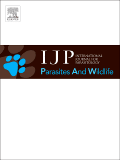
International Journal for Parasitology-Parasites and Wildlife
Advancing Knowledge in Parasite-Host DynamicsThe International Journal for Parasitology-Parasites and Wildlife, published by ELSEVIER, is a premier open-access journal dedicated to advancing the field of parasitology and wildlife research. Established in 2012, this influential journal has garnered a reputation for excellence, as evidenced by its impressive rankings, including Q1 in Animal Science and Zoology and Q2 in both Infectious Diseases and Parasitology as of 2023. With an ISSN of 2213-2244, this journal serves as a critical platform for researchers, professionals, and students, fostering a deeper understanding of parasite-host interactions and their ecological impacts. The journal encourages innovative studies that contribute to the mitigation of infectious diseases and enhance wildlife conservation efforts. With a commitment to open access, the International Journal for Parasitology-Parasites and Wildlife ensures that cutting-edge research is easily accessible to the global scientific community, helping to bridge gaps in knowledge and stimulate further inquiry.

ISRAEL JOURNAL OF VETERINARY MEDICINE
Bridging Gaps in Veterinary Knowledge for Global ImpactThe Israel Journal of Veterinary Medicine, published by the Israel Veterinary Medical Association, serves as a vital resource for researchers, professionals, and students in the fields of veterinary medicine and animal science. With a commitment to advancing knowledge across diverse veterinary disciplines, this journal plays a crucial role in disseminating significant findings and innovations that influence both local and global veterinary practices. Although it currently holds a Q4 ranking in both the Animal Science and Zoology and Veterinary (miscellaneous) categories, the journal's open access policy, enabling free availability of articles, aspires to increase its accessibility and engagement among the academic community. The journal's convergence of research from 2007 to 2024 showcases its dedication to continuously contributing to the evolving landscape of veterinary science.

FOLIA PARASITOLOGICA
Navigating the Frontiers of Parasitic Biology.FOLIA PARASITOLOGICA is a distinguished scholarly journal published in the Czech Republic, focusing on the field of parasitology. With a commitment to advancing knowledge in parasitology, the journal covers a wide array of topics including the biology and control of parasites, host-parasite interactions, and epidemiology. Having been in circulation since 1971 and currently converging its years of research until 2024, FOLIA PARASITOLOGICA has established itself as a vital resource for researchers, professionals, and students in immunology and microbiology, currently ranked in the Q3 category for Parasitology. Although it does not operate under an open-access model, the journal's relevance is underscored by its Scopus ranking, where it is positioned 47th out of 79 in the field, reflecting the high standards of research it publishes. By hosting a range of studies and reviews, FOLIA PARASITOLOGICA continues to contribute significantly to the scientific community, fostering advancements that enhance our understanding and management of parasitic diseases.
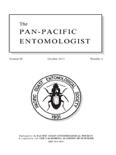
PAN-PACIFIC ENTOMOLOGIST
Unveiling the Secrets of EntomologyPAN-PACIFIC ENTOMOLOGIST, published by the PACIFIC COAST ENTOMOLOGICAL SOCIETY, serves as a pivotal platform for disseminating research in the field of entomology, encompassing a variety of topics related to insects and their interactions within ecosystems. Operating under the ISSN 0031-0603 and E-ISSN 2162-0237, this esteemed journal has been committed to advancing our understanding of insect science since its initial publication in 1993, with coverage extending to 2024. Notably categorized in the Q4 quartile of the insect science category and ranked in the 5th percentile of Scopus, PAN-PACIFIC ENTOMOLOGIST offers a unique opportunity for scholars, professionals, and students to engage with cutting-edge research and contribute to the scientific dialogue within this specialized field. While currently not open access, the journal is dedicated to the dissemination of empirical studies, reviews, and short communications that elucidate the crucial roles insects play in agriculture, ecology, and public health. Situated in the heart of San Francisco, California, this journal not only enriches the academic community but also promotes a deeper appreciation for the diverse and often under-appreciated world of entomology.
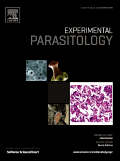
EXPERIMENTAL PARASITOLOGY
Advancing Knowledge in Parasite Biology and ImmunologyEXPERIMENTAL PARASITOLOGY, published by Academic Press Inc Elsevier Science, is a prominent journal in the domains of immunology, infectious diseases, and parasitology, with roots extending back to 1951. This journal, bearing the ISSN 0014-4894 and E-ISSN 1090-2449, serves as a critical conduit for sharing advancements in the understanding of parasite biology, host-parasite interactions, and the immunological responses elicited by parasitic infections. Although it currently operates under a subscription model without open access options, its rigorous scholarly content is vital for researchers and practitioners alike looking to stay informed on the latest developments and applications in the field. With a recent categorization as Q3 in key scientific categories, including Infectious Diseases and Parasitology, and a Scopus ranking solidifying its relevance, EXPERIMENTAL PARASITOLOGY is an essential resource for those committed to advancing knowledge and solutions to parasitic diseases.

Current Research in Parasitology & Vector-Borne Diseases
Fostering interdisciplinary dialogue in parasitology research.Current Research in Parasitology & Vector-Borne Diseases, published by ELSEVIER, is an influential journal dedicated to advancing the understanding of parasitology and vector-borne diseases. With an ISSN of 2667-114X, this journal is highly esteemed in the field, holding a prestigious Q1 quartile ranking in categories such as Animal Science and Zoology, Insect Science, and Parasitology, as well as a notable Q2 ranking in Virology for 2023. The journal's focus spans a crucial intersection of disciplines, offering a platform for innovative research that directly addresses global health challenges posed by parasites and vectors. Researchers benefit from its robust open-access model, which facilitates unrestricted dissemination of knowledge, making essential findings accessible to a wider audience. The journal continues to play a pivotal role in fostering scholarly dialogue and interdisciplinary collaboration within the scientific community, serving as a vital resource for professionals, students, and academicians interested in the dynamic and evolving field of parasitology.
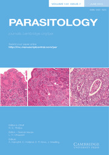
PARASITOLOGY
Unveiling the complexities of host-parasite dynamics.PARASITOLOGY, published by Cambridge University Press, is a prestigious journal that has been at the forefront of research in the field of parasitology since its inception in 1908. This esteemed publication carries the ISSN 0031-1820 and E-ISSN 1469-8161, and its rigorous peer-reviewed articles provide insights into both fundamental and applied aspects of parasitic biology, infectious diseases, and host-parasite interactions. With a commendable impact factor, PARASITOLOGY ranks in the top quartile (Q1) for Animal Science and Zoology and holds Q2 rankings in both Infectious Diseases and Parasitology categories, indicating its significant influence and contribution to these disciplines. The journal's diverse scope allows for a broad range of research articles, reviews, and case studies, making it an essential resource for researchers, professionals, and students seeking to stay updated on the latest developments in the field. Based in the United Kingdom, PARASITOLOGY offers valuable access to critical research in an era where understanding parasitic diseases is more vital than ever, and continues to shape the future of this important scientific field.
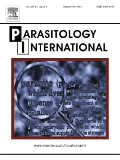
PARASITOLOGY INTERNATIONAL
Championing Excellence in Parasitic Disease StudiesParasitology International, published by Elsevier Ireland Ltd, is a leading journal in the field of parasitology and infectious diseases. With its ISSN 1383-5769 and E-ISSN 1873-0329, this esteemed journal provides a platform for the dissemination of high-quality research covering various aspects of parasitic diseases and their treatment. Recognized for its rigorous peer-review process, Parasitology International currently holds a commendable Q2 ranking in both the Infectious Diseases and Parasitology categories for 2023. The journal's Scopus rankings further enhance its reputation, positioning it at Rank #33/79 in Parasitology and Rank #166/344 in Infectious Diseases. Covering a broad range of topics from host-parasite interactions to novel treatments, this journal plays a pivotal role in advancing knowledge and fostering innovation within the research community. Though it does not currently operate as an open access journal, it continues to attract contributions from leading experts around the world, making it an invaluable resource for researchers, professionals, and students committed to understanding and combating parasitic diseases.

KOREAN JOURNAL OF PARASITOLOGY
Advancing the Science of ParasitologyKorean Journal of Parasitology is a respected publication in the field of parasitology, originating from the esteemed Korean Society of Parasitology and affiliated with Seoul National University College of Medicine. Established in 1977, this journal focuses on disseminating significant research findings related to parasitic diseases, their vectors, and control measures, serving as a vital resource for researchers, medical professionals, and students alike. Although coverage in Scopus has been discontinued as of 2022, the journal remains a valuable platform for in-depth studies within the areas of Infectious Diseases and Immunology. With an ISSN of 0023-4001 and an E-ISSN of 1738-0006, the journal promotes open access to enhance academic sharing. Despite its current Scopus rankings, which place it in the 38th percentile for Infectious Diseases and 37th percentile for Immunology and Microbiology (Parasitology), it continues to contribute to the global discourse on parasitological research, encouraging collaboration and emphasizing the importance of this field in public health.